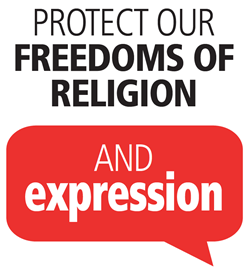Dear Friend,
A Christian student was recently expelled from the University of Manitoba’s College of Medicine for expressing personal views on his Facebook page.
He was not spreading hate propaganda nor was he inciting violence against any one or any group. What got him in trouble was his external (i.e., unrelated to the school) social media posts expressing his religious beliefs on abortion and his political views on gun ownership. One Facebook post was a Sunday school essay in which he had argued strongly against abortions.
The university launched an investigation into his conduct when 18 anonymous complaints were filed against him, alleging that his Facebook posts made the complainants feel unsafe. When he was made aware of these allegations, he removed the posts from his Facebook page. And in an effort to avoid any disciplinary action, he also wrote numerous apologies to both students and faculty for having offended them…All to no avail!
His actions were judged to be disingenuous because he was unwilling to renounce his beliefs. In August 2019, he was found guilty of non-academic misconduct and expelled, but was allowed to continue his studies while he appealed the decision. In July 2020, the University Discipline Committee upheld the original decision to expel him, ruling that his opinions were “misogynistic and hostile to women,” causing a “negative impact on the learning and work environment.” The committee ruled that he would have to repudiate his beliefs if he wanted to continue his studies. In other words, he was told he would have to abandon his pro-life views in order to pursue a career that is inextricably associated with the saving of lives!
In August 2020, the student’s lawyer filed a Notice of Application for Judicial Review at the Manitoba Court of Queen’s Bench on his behalf. A motion was also filed for an injunction to keep him in medical school until his judicial review is heard in March 2021. This was denied.
In his affidavit to the Queen’s Bench, he wrote that being a Christian “is the very essence of my being, and I cannot be separated from my faith."
No Canadian should ever be silenced or compelled to deny their sincerely held beliefs in order to avoid discrimination or professional sanction/discipline. Our Charter guarantees the freedoms of religion, conscience, thought, belief, opinion and expression for all Canadians. These freedoms must be respected and upheld, even when the views expressed are unpopular or controversial.
We live in a vibrant multicultural and multi-faith society, with a diversity of beliefs and opinions. This diversity means we will not always share similar views or attitudes on many hot-button issues. We risk offending someone every time we express an opinion, but healthy civil discourse is what strengthens us as a free and democratic society.
In Canada, our public colleges and universities are the last places we would expect to encounter censorship or the suppression of ideas. A university should be a place where different views are expected, encouraged and engaged in respectful debate – not silenced because they are unpopular.
Students should not be disciplined for merely expressing their sincere thoughts or beliefs, on or off campus. If students cannot speak and debate freely in the pursuit of truth and the advancement of knowledge – if they are not given opportunities to grapple thoughtfully with their own personal convictions in light of diverse opinions and views – what, then, is the value in higher learning?
The EFC is seeking intervener status in this case to uphold the fundamental freedoms of religion, belief and expression – for everyone. Should merely holding certain views on issues be sufficient grounds for barring someone from attending university or from pursuing certain studies? Should a university have the right to impose academic discipline on the basis of students’ non-academic social media posts, e-mails, texts or websites? Should personal opinions shared off-line, in private conversations or letters, be subject to formal scrutiny, too?
Beyond the threats to freedom of thought, opinion and belief, this case will also test the extent to which professionals might suffer discipline or expulsion because of their views. Should health care providers in Canada who embrace pro-life views lose their licences to practice? Should lawyers who believe that marriage is as a sacred union between one man and one woman be disbarred? Should religious adherents be fired as public school teachers because their sincerely held beliefs differ from the popular social orthodoxy?
This case will set an important precedent about the ability of Canadians to hold and express deeply held beliefs without fear of professional censure. At stake is the free expression that allows for the healthy discussion and debate of policy, ideas and beliefs. We want the best ideas to prevail on fundamental issues that are important to all of us, for the good of every Canadian.
As always, your prayers and financial gifts in support of the EFC are greatly appreciated, especially as we seek legal intervention status in this case. We thank God for you and your partnership in our Kingdom work!